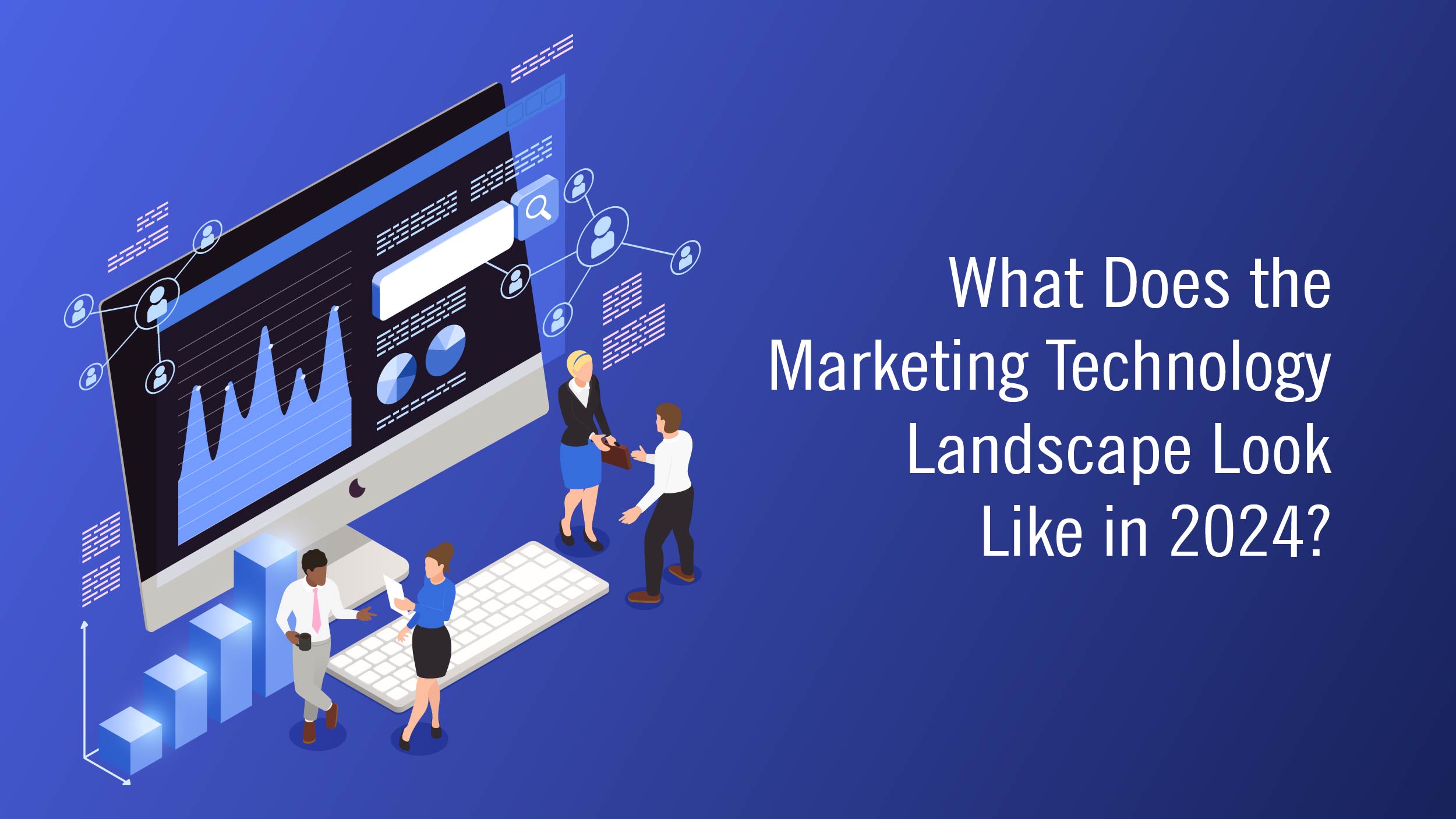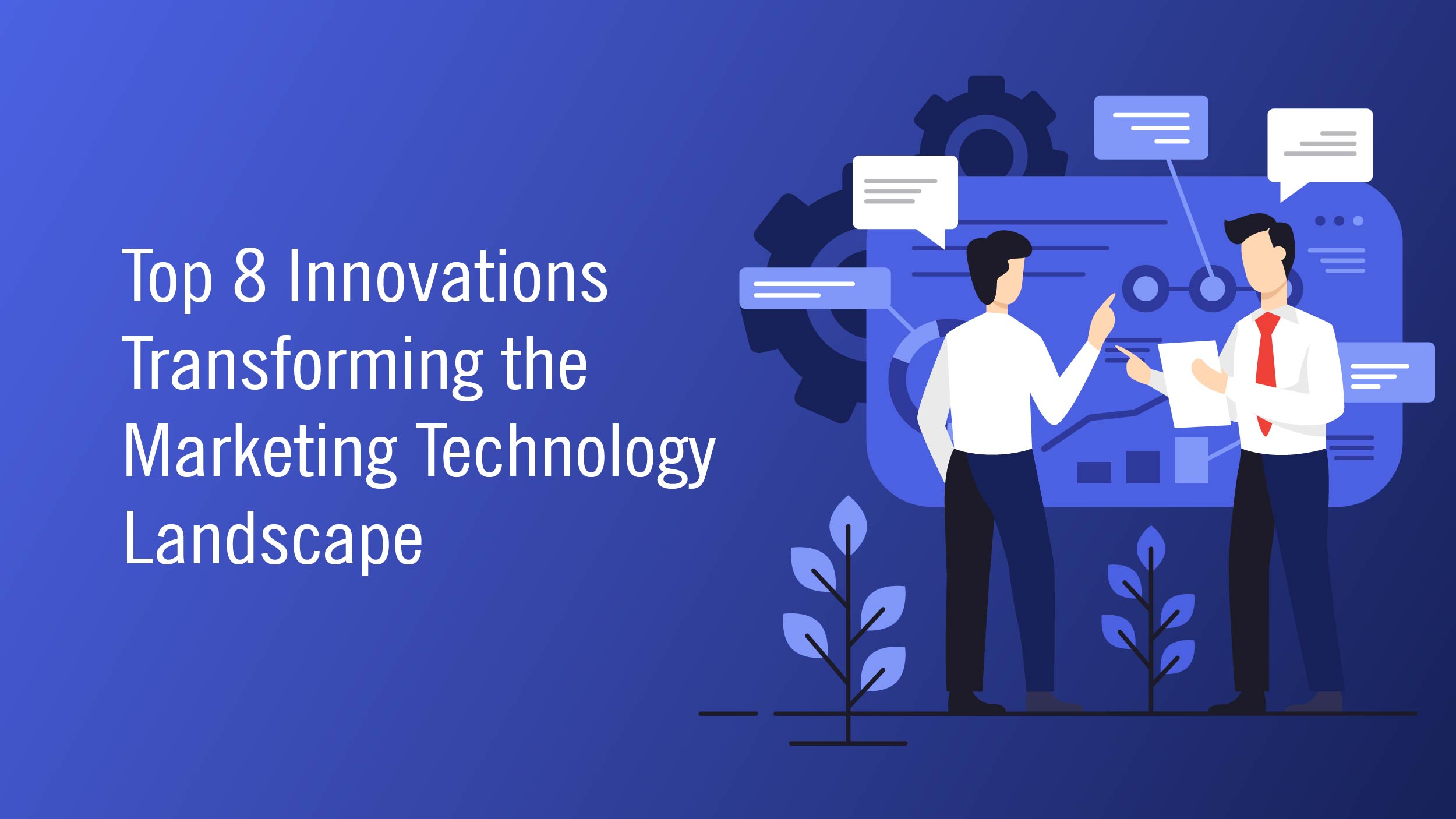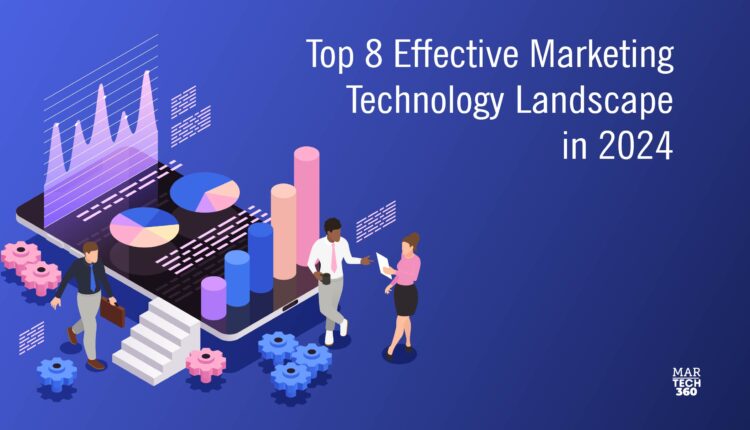The fusion of trending technologies is changing how businesses interact with their customers in the ever-evolving world of the marketing technology landscape (Martech). As each year unfolds, new trends in martech surface, expanding possibilities, transforming business-audience interactions, and establishing novel standards for marketing achievements.
This blog analyzes the dynamic synergy between various innovations in the marketing technology landscape, from artificial intelligence (AI) and machine learning (ML) to augmented reality (AR) and data analytics.
What Does the Marketing Technology Landscape Look Like in 2024?
 The marketing technology landscape in 2024 is likely to be characterized by a wide range of tools and platforms designed to assist marketers in various aspects of their work. These tools may include customer relationship management (CRM) systems, marketing automation platforms, content management systems (CMS), social media management tools, analytics and reporting platforms, email marketing software, search engine optimization (SEO) tools, and more.
The marketing technology landscape in 2024 is likely to be characterized by a wide range of tools and platforms designed to assist marketers in various aspects of their work. These tools may include customer relationship management (CRM) systems, marketing automation platforms, content management systems (CMS), social media management tools, analytics and reporting platforms, email marketing software, search engine optimization (SEO) tools, and more.
Additionally, advancements in AI and machine learning are expected to play a significant role in marketing technology. AI-powered tools can help automate tasks, personalize customer experiences, optimize campaigns, and provide valuable insights for decision-making.
Integration and interoperability between different marketing technology solutions are also becoming increasingly important. Marketers are seeking seamless connectivity and data flow between various tools to create a unified view of their customers and deliver consistent experiences across channels.
Furthermore, privacy and data protection regulations, such as the General Data Protection Regulation (GDPR) and the California Consumer Privacy Act (CCPA), have influenced the marketing technology landscape. Tools and platforms that prioritize data privacy and compliance are likely to gain prominence.
Top 8 Innovations Transforming the Marketing Technology Landscape
 Let us take a closer look at the top eight trends transforming the marketing technology landscape in 2024.
Let us take a closer look at the top eight trends transforming the marketing technology landscape in 2024.
AI and Machine Learning
One prominent 2024 trend involves the surging adoption of AI and machine learning in MarTech. While these technologies currently automate tasks like email marketing and lead scoring, their capabilities extend further.
In the years ahead, we may anticipate the usage of AI and machine learning to tailor content, improve ad campaigns, and even come up with fresh marketing concepts. According to research by Gartner, 84% of digital marketing leaders think utilizing AI/ML improves the marketing function’s capacity to provide real-time, individualized customer experiences. In the expansive realm of the marketing technology landscape, these advanced technologies excel at analyzing vast amounts of data, unveiling intricate patterns, and extracting insights that often elude human observation.
Wearable Tech Integration
Integrating wearable martech opens up opportunities for reaching out to users and engaging with audiences. Highly targeted advertising is made possible by smartwatches and other tools. For example, a person looking for a clothing store may receive a notification from one as they pass by.
Marketers can approach prospective customers at the ideal time and location thanks to wearable technology trends, which boosts conversion rates.
Additionally, wearable technology can contribute to search engine optimization like how smartphone optimization has grown to be a significant ranking factor. To rank higher, website administrators may eventually need to make their platforms compatible with smartwatches and other wearable technology.
VR/AR Content
VR marketing efforts have been in the headlines for a while now. For instance, Adidas has one that allows users to track two hikers in real-time. The use of augmented and virtual reality in martech efforts appeals to consumers’ desire to place more value on the shopping experience than on the cost of the item.
In addition, marketing innovations can be leveraged to target a younger demographic. Kids will be more receptive to an immersive campaign than to online marketing or TV commercials as tools.
With the release of the Bedtime VR Stories app, Samsung demonstrated the effectiveness of immersive technology in bringing together youngsters and brands.
Chatbots
Oracle discovered that every second client expects around-the-clock customer assistance. Without the use of chatbots, another of our top martech trends, it is nearly difficult to achieve this degree of client friendliness.
Thanks to improvements in machine learning and artificial intelligence, chatbots might resemble humans significantly more in the coming five years. One of the most promising trends in martech development that experts may use to gather more client inquiries and boost conversion rates is the creation of voice bots, such as Microsoft Cortana, Google Assistant, and others.
Programmatic Ads
At present, when it comes to ad setup, marketers still have a significant role to play. Managers must make numerous adjustments to the campaign settings to run a successful campaign because default settings are rarely ideal.
Spending on programmatic advertising reached close to $100 billion in the US alone in 2023. The US and UK are predicted to spearhead the transformation and account for the largest proportion of programmatic trade and advertising.
Voice Technology
In modern homes, smart speakers are now a common sight. Research indicates a 78% growth in voice assistant adoption between 2017 and 2018, a trend that has continued. In the US alone, Statista estimates 135.6 million voice assistant users by 2023.
Also Read: 4 Proven Strategies to Measure the Impact of Influencer Marketing ROI in 2024
Blockchain-based marketing tools
One of the biggest issues marketers deal with is advertising fraud. According to research, the ad fraud expenses for 2022 stand at $81 billion and resulted in a rise to $100 billion in 2023. In 2024, utilizing blockchain anti-fraud technologies is imperative to make sure you can track a campaign’s KPI clearly and are not wasting your budget.
Marketers may also provide users with credible facts to support their promises thanks to blockchain technology. For example, a platform built on the blockchain can maintain records that attest to the product’s provenance or credibility.
Internet of Things
The IoT stands as the final trend in our martech list, offering efficient audience interaction. Its widespread implementation brings five main marketing changes:
- Streamlined sales data exchange, aiding in market adaptation.
- Instant consumer analysis through IoT-CRM integration.
- Improved device service quality via self-assessment and predictive maintenance.
- Enhanced advertising effectiveness by tailoring campaigns using IoT insights.
- SMM optimization, acknowledging the transformative power of social media marketing.
Final Thoughts
The interplay of emerging technologies within the marketing technology landscape is dynamic and poised for continual evolution in the future. Businesses must use the promise of AI, machine learning, augmented reality, and data analytics as they continue to develop to provide more personalized experiences for customers. Companies can negotiate the altering marketing technology landscape, optimize tactics, and ultimately succeed in a time when technology and marketing are inseparably intertwined by embracing this tech-driven revolution.


Comments are closed.